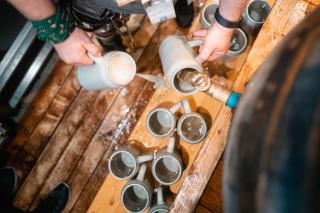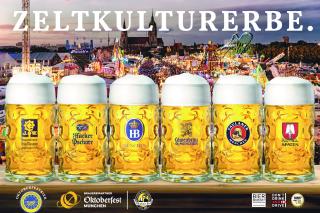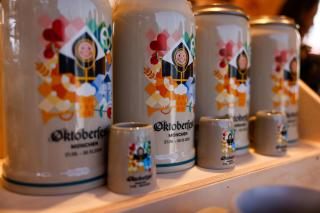You can not only enjoy your beer in the tent
The tents are full, the weather is beautiful, and you want to eat, drink, and enjoy the Oktoberfest atmosphere? Then off we go to the beer garden! Not only at Munich’s Viktualienmarkt or the Chinese Tower, but also on the Theresienwiese!
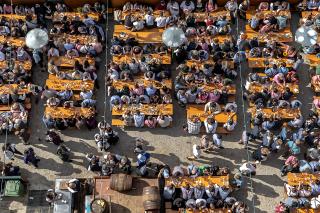
The festival tent beer gardens on the Oktoberfest
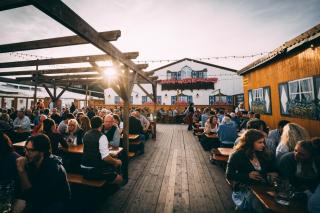
Many people don’t even know when they first visit the Oktoberfest: Every big tent also has a beer garden where you can enjoy your beer and half roasted chicken outside in fresh air and sunshine. And many of the small tents also have open-air guest gardens. If you expect chestnut trees over your head and pebbles under your feet, you’ll be disappointed, but the beer gardens are a great alternative to tents — especially if they’re full or even closed. You’ll almost always find a place to sit in the beer garden, in part because you can’t make a reservation here. Beer and chicken taste just as good here, and if you sit near one of the doors to the tent, you’ll also hear some of the music and the atmosphere from inside.
The history of beer gardens in Bavaria
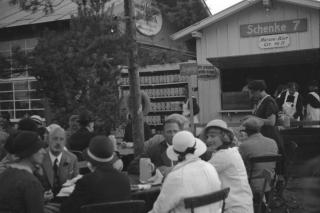
How did the idea of the beer garden actually come about? From a problem, the Bavarian brewing regulations of 1539, which only allowed beer to be brewed between autumn and spring. In summer, brewing was too dangerous, as the risk of fire during boiling was too great. The brewer Joseph Pschorr, married to Maria-Theresia Hacker, came up with the idea of digging a huge underground beer cellar to keep the beer cool and fresh throughout the summer. Chestnut trees were planted on top of the cellars, which were usually driven into the high banks of the Isar, to provide shade for the ground.The trees did not damage the vaults with their shallow roots and grew very quickly. This is how cosy gardens were created above the cellars - especially on the Schwanthalerhöhe to the left of the Isar, in Haidhausen and the Au to the right of the Isar.
The Bavarian beer garden regulations even apply at the Wiesn
Not everywhere, we have to say up front. In a real Bavarian beer garden, such as the one at the Chinaturm in the English Garden or the Hirschgarten, you are allowed to bring your own snacks (not drinks) and eat there. This regulation is something very special. Many Munich residents head to their favourite beer gardens at the weekend with a food basket and tablecloth. It's sociable and inexpensive. And it's even allowed at the Wiesn: In all beer gardens at the Oktoberfest, you are actually allowed to bring and eat your own snacks!
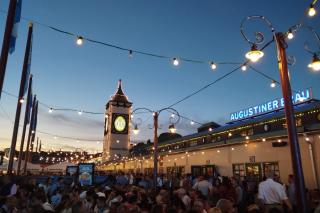
Bring your own snack: How it came to this
The new beer gardens were located in the Munich suburbs and attracted many visitors. This annoyed the brewers and landlords of the city, as they were not allowed to sell their beer directly. King Maximilian I Joseph defused the beer dispute with the Beer Garden Ordinance of 1812, which allowed the municipal brewers to serve beer, but not to sell food. And so the people of Munich brought their own snacks with them. This tradition has remained to this day, even if, of course, there are now all kinds of food to buy in every beer garden.
In the Munich beer garden: Dos and Don’ts
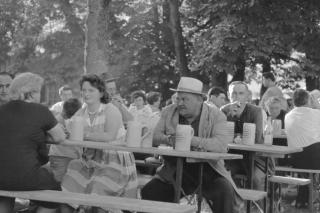
Similar to the tent, the beer gardens at the Oktoberfest are also very popular: Hockt’s Euch zam! Specifically because you can’t reserve a table outside, you’ll rarely have a table for yourself. Instead, look for some company. All according to the motto: Hockt’s Euch hera, na samma mehra! (Have a seat here, it’ll be more fun!) Still, you should ask before you sit down, just to make sure that nobody’s just gone to the bathroom and coming right back.
The rule in the classic city beer garden applies: Bringing your own snacks is explicitly allowed, but please do not bring any drinks, soft drinks, or prosecco. Liquids are bought from the host. Some beer gardens have areas serviced by waitstaff, most well-signposted or recognizable by the fact that there are tables and chairs instead of beer sets.
